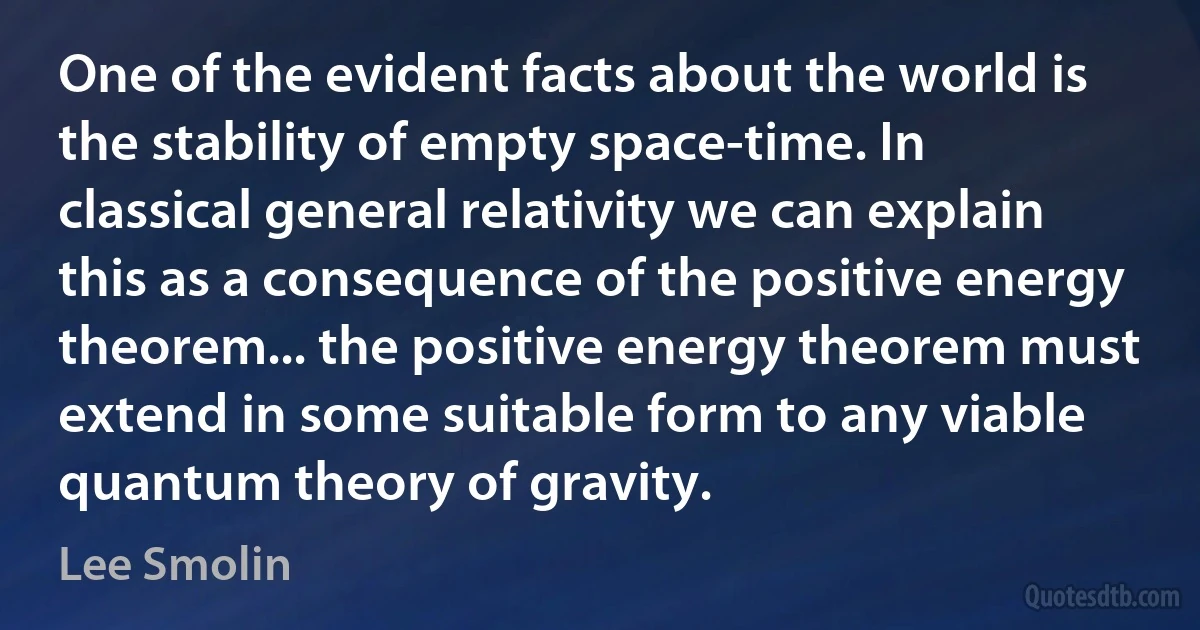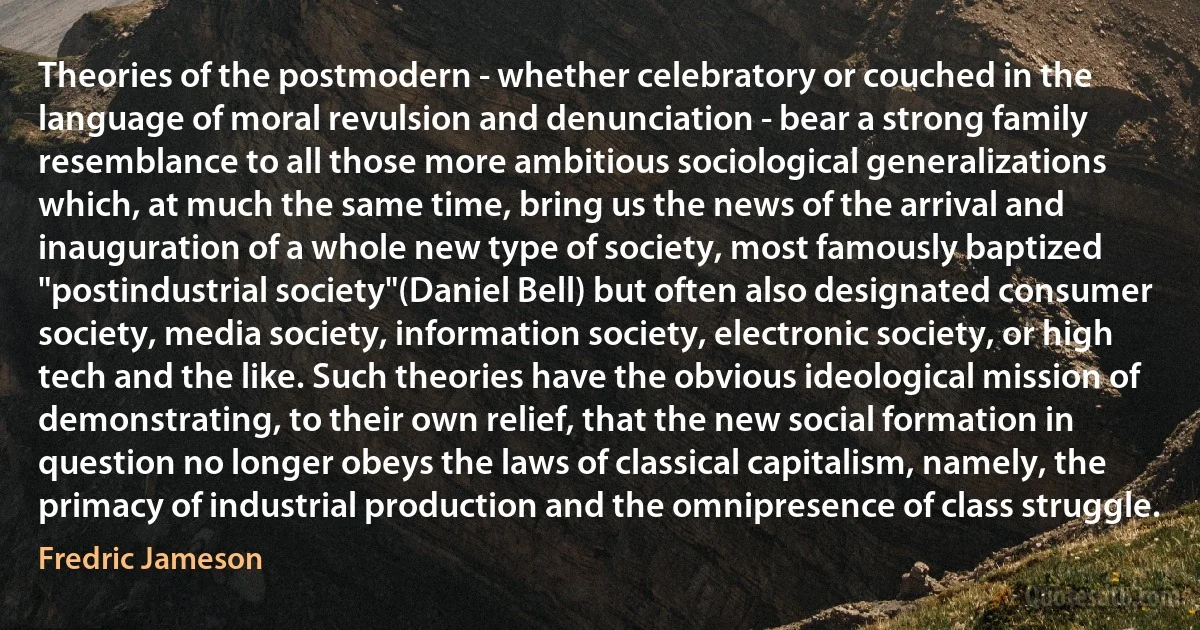Classical Quotes - page 19
In string theory one studies strings moving in a fixed classical spacetime. ...what we call a background-dependent approach. ...One of the fundamental discoveries of Einstein is that there is no fixed background. The very geometry of space and time is a dynamical system that evolves in time. The experimental observations that energy leaks from binary pulsars in the form of gravitational waves-at the rate predicted by general relativity to the... accuracy of eleven decimal places-tell us that there is no more a fixed background of spacetime geometry than there are fixed crystal spheres holding the planets up.

Lee Smolin
At present, a nonspecialist might well regard the Wiener-Kolmogorov theory of filtering and prediction [1, 2] as "classical' - in short, a field where the techniques are well established and only minor improvements and generalizations can be expected.
That this is not really so can be seen convincingly from recent results of Shinbrot [3], Stceg [4], Pugachev [5, 6], and Parzen [7]. Using a variety of methods, these investigators have solved some long-stauding problems in nonstationary filtering and prediction theory. We present here a unified account of our own independent researches during the past two years (which overlap with much of the work [3-71 just mentioned), as well as numerous new results. We, too, use time-domain methods, and obtain major improvements and generalizations of the conventional Wiener theory. In particular, our methods apply without modification to multivariate problems.

Rudolf E. Kálmán
Known for centuries, a tenet of classical liberalism, the pacific nature of democracy has become largely forgotten or ignored in the last half-century. That democracy is inherently peaceful is now probably believed by no more than a few prominent peace researchers. In part this has been due to the intellectual defection of Western intellectuals from classical liberalism to some variant of socialism, with its emphasis on the competitive violence and bellicosity of capitalist freedoms. Many intellectuals, and in particularly European and Third World peace researchers, have come to believe that socialist equalitarianism is the answer to violence; others, particularly American liberals, believe that if the socialist are wrong, then at least democracies are no better than other political systems in promoting peace.

Rudolph Rummel
The subject matter of linguistics comprises all manifestations of human speech, whether that of savages or civilized nations, or of archaic, classical or decadent periods. In each period the linguist must consider not only correct speech and flowery language, but all other forms of expression as well. And that is not all: since he is often unable to observe speech directly, he must consider written texts, for only through them can he reach idioms that are remote in time or space.

Ferdinand de Saussure
My background in music came from me playing drums and piano as a young child. My grandmother was a pianist and I was influenced by her and my parents were playing rock records which influenced my drumming. I was a fan of film scores, rock, classical, jazz, and hip-hop in my early years and tried to learn as much about each of those genres as possible. I began writing music in a serious way in my teen years while I was playing in various bands and orchestras.

Brian Tyler
The present article is almost wholly devoted to a single problem-the definition of truth. Its task is to construct-with reference to a given language-a materially adequate and formally correct definition of the term 'true sentence. This problem, which belongs to the classical problems of philosophy, raises considerable difficulties. For although the meaning of the term 'true sentence' in colloquial language seems to be quite clear and intelligible, all attempts to define this meaning more precisely have hitherto been fruitless, and many investigations in which this term has been used and which started with apparently evident premisses have often led to paradoxes and antinomies (for which, however, a more or less satisfactory solution has been found). The concept of truth shares in this respect the fate of other analogous concepts in the domain of the semantics of language.

Alfred Tarski
The BEH mechanism operates within the context of gauge theories. Despite the fact that grand unification schemes reach scales comparable to the Planck scale, there was, a priori, no indication that Yang-Mills fields offer any insight into quantum gravity. The only approach to quantum gravity that had some success, in particular in the context of a quantum interpretation of the black hole entropies, are the superstring theory approaches and the possible merging of the five perturbative approaches (Type IIA, IIB, Type I and the two heterotic strings) into an elusive M-theory whose classical limit would be 11-dimensional supergravity.

Francois Englert
What we hear about eternal inflation or the string landscape, seems somehow unavoidably to lead to some kind of multiverse. However, it seems to me there is a fundamental problem there. Once of course you have the multiverse, then you can start playing around and try to find probability or getting to the anthropic principle, or whatever. But the point is that the picture is essentially a classical one, and it is difficult to see that if you have many universes, coming essentially with an inflationary state, that there would not be plenty of horizons in this. Now the quantum mechanics of horizons is, I think, perfectly not understood. The simplest example is the black hole, where after all nobody knows really if the problem lies in the singularity or if it lies really already in the horizon.

Francois Englert
Towards the end of the twelfth century, while Western Europe was still wavering between a dying Roman influence and a dawning Gothicism, preliminaries to a medieval era which would make possible the development of a world-wide humanism, Asia had already lived through her classical period and, sinking into decay, was preparing to face a long period of political and spiritual unrest. While India was beginning to suffer under the yoke of the victorious Mussulman, who had come down on her from the mountains of Afghanistan and the plains of Iran, and while the domination of the Khmers was reaching its climax at Angkor, China, under pressure from the barbarians of the north, was withdrawing to the south where the Song empire, thinking itself safe from invasions, continued to live a life of luxury.

Louis Frédéric
Without...Yehudi Menuhin, the West may not have found Indian classical music and decades later...thanks to Menuhin's chance meeting and later lasting friendship with the master sitarist Ravi Shankar, the Wets witnessed the sublimity that the merging of the Western and Indian classical music could produce.

Ravi Shankar
Classical mechanics is mathematical not only in the sense that it makes use of mathematical terms and methods for abbreviating arguments which might, if necessary, also be expressed in the language of everyday speech; it is so also in the much more stringent sense that its basic concepts are mathematical concepts, that mechanics itself is a mathematics.

Eduard Jan Dijksterhuis



